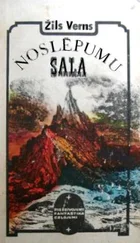I had thought his eyes were soft, but they weren’t. They were hard, like the thick brown ice that collects over muddy puddles, the kind you think you can see through until you really look. I don’t trust you, those eyes said. I’ve been played with before.
I shrugged back. “The more you know, the easier life is. I can teach you, if you like.” I hoped I could, anyway. I had been the youngest child, smallest sibling; always the student, never the teacher.
I think he knew I didn’t feel as casual as I looked; he wasn’t stupid. But maybe it was the fact that I was willing to pretend that made him decide to take the risk. He nodded.
“After the break, then.” When Magyar took her own rest.
After the break I took him into the concrete bunker. I pointed to the red button Magyar had used a few weeks ago, feeling a little self-conscious.
“I can’t slide back the floor to show you just how much water is pouring in here every minute, but believe me, four and a half million gallons a day is a lot.”
The numbers obviously meant nothing to him. You can do this, I told myself. “Try to imagine a hose as big around as a pregnant woman squirting green or orange water polluted with all kinds of dangerous and unpleasant guck at high pressure into an empty swimming pool. When the pool reaches a certain depth, the water starts to pour out the other end, so eventually you get the water roaring out the other side as fast as it pours in. Now imagine that it’s an enchanted pool, that somehow during its time in there, the water is changed from stuff that will kill you to clear, clean, crystal drinking water, and that water goes straight into the mains, where old men and little children drink it from the tap. It might not sound like much, but there are two things to remember. The water in that fat hose never, ever stops. And, most important, we—you and me and Cel and Kinnis and Magyar and all the others—are the magic. If we screw up or stop working, people die.”
Shock, in Paolo, was a strange turning of his arms and a blank cast to his face. I watched him struggle with the idea of all that responsibility. “But what about the machines, the failsafes?”
“They work well enough, most of the time. But if the systems go down again, or if someone misreads the alarms, or there’s an aberration so momentary that the sensors miss it at the influent point, then it’s up to us. And that’s just assuming that the problem is something the designers have anticipated. And that it’s accidental.”
“Sabotaged,” He blinked. “How could someone sabotage this place?”
“Any number of ways, but the best place would be right at the beginning—close the whole train down.”
“The influent?”
“Right here.” I pointed at the floor, which shook very slightly with the vibration of the water flowing beneath us.
“Put something big or lethal in there and, assuming the systems catch it in time, they’ll close everything down. If they don’t catch it at once, then the contamination will go on through to the whole of the primary sector and pollute four or five million gallons. And then there’s human error.” I showed him the spigot, the initial test readouts—all automated—the various lights that indicated what bacteria and algae were currently being used, their estimated biomass and suggested nutrients. “Depending on what’s coming in, we add biomass, or change it, or decrease nutrients. So if we get an influx of something nasty that kills selected strains, we can re-add. Or if some strain is struggling, we can add preferred nutrients or decrease the nutrients of the strain that’s proliferating too much and suffocating the desired strain. The initial readouts here, and then the ones I give to Magyar, determine what amount of which strain is needed.”
I led him out of the concrete bunker. “It’s important to understand the general principles.” I stopped by trough forty-one. “Looks like the gravel here needs reraking. You start at that side.” We pulled on our masks and got to work. I waited until we had both established our rhythms. “What did you learn from the orientation video?”
He pulled himself straight, as though this was a school test.
“Keep working. Magyar won’t be on her break forever.”
“Oh. Well, undifferentiated waste comes in there,” he pointed with his chin back to the bunker, “where it’s churned up to mix the solid waste into the liquid. Then the slurry is split into eighty treatment streams and piped into the troughs. That’s where bacteria change some of the more poisonous nitrogen compounds into less poisonous ones.”
I was impressed. “You picked up a lot from the orientation video. But the troughs do more than start the denitrification process. They also begin the biodegradation of some of the other substances. Go on.”
“The surface water is siphoned off to the next stage, to those big tanks, the transparent ones, where it’s busy and noisy and hot.”
“The silos are kept at over forty degrees Celsius—forty-four to be exact—for the mesophilic bacteria that do all the work at that stage.” It felt good to talk about species after so long. “And the water’s kept in violent motion—spiral jet mixers, coarse bubble diffusers—to eliminate stagnation and prevent liquid stratification, always likely with heated water. And it helps to keep those solids suspended.”
He pulled down his mask to get more air. It was hard to work and talk and get enough oxygen through the filters all at the same time. “You know a lot.” Faintly challenging. His look around—at the rakes, the troughs, the stinking brown smear on my plasthene-coated thigh—was clear. If you know so much, how come you shovel shit like the rest of us?
I was not in the mood to play games. “You don’t know me, or why I’m here. I don’t know you. But I’ve decided to trust you, anyway. And you can learn from me.” I needed him to trust me. I needed to help him. I needed, just this once, to feel good about myself.
My bluntness disconcerted him. He raked away at the gravel for a while. I was content to just do my work, too, and let him think.
Eventually, he stopped. I stopped, too, and waited. “I thought that water treatment was all about separating the sludge from the liquid. But…” He shrugged, and I noticed again how graceful he was, but how that grace stopped short of his arms and legs. A vague memory of some hotel room and Katerine on the screen scooted almost within reach, then disappeared.
“That’s the way it used to work, when the solids were going to be buried or just spread around in fields to dry and decompose as best they could and be carted out to sea in barges. Here, they’re actually used. Once at the tertiary stage and beyond, the algae, moss, and duckweed use the nutrients in the sludge. The moss is taken away and recycled for the heavy metals consolidated in it, but the algae and duckweed are eaten by snails and zoo-plankton. The snails are harvested and added to the next stage—where they’re eaten by the bass and tilapia and minnows. The fish add to the solid waste, of course, but in a form readily used by the lilies. Except in the primary sector, where the air scrubbers take out some of the more toxic gases, everything that’s produced is used to increase production of something else. That’s the beauty of—” I broke off and pulled my mask back up. Magyar was heading our way.
Her stride was stiff and fast, and even from here I could see the muscles in her jaw clenching and unclenching. My PIDA might be safe, but something had obviously happened to make Magyar very, very angry. I steeled myself, but Magyar walked right past. Her rage radiated from her like heat. I wasn’t the only one who had noticed. Kinnis looked over from his trough and shrugged elaborately. I wondered what was going on.
Читать дальше












